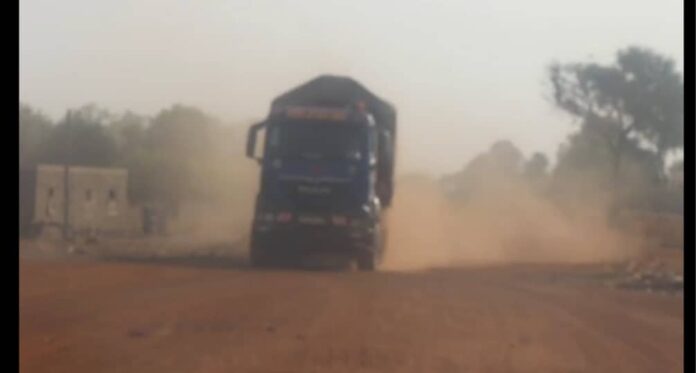The Tumu-Sakai-Walembelle-Wa road has become unmotorable.
Residents of the affected communities in the Sissala East Municipality of the Upper West Region want government to give the road a facelift to ease movement of people and goods.
According to the residents, the current state of roads in the Sissala enclave are nothing to write home about despite their contributions to the Country’s economy. They want government through its recent District Road Improvement Programme, to enhance the road for them.
It would be recalled that the government launched its District Road Improvement Programme (DRIP) which seeks to enhance Ghana’s road network by decentralizing road infrastructure development.
This program seeks to address the challenges faced by Metropolitan, Municipal, and District Assemblies (MMDAs) across the country.
The Sissala area, known for its agricultural productivity, particularly in corn production, stands as a testament to the potential that remains untapped due to inadequate road infrastructure.
The current state of the roads in the area hinders not only transportation of goods but the overall economic development of the Upper West Region.
The Tumu-Sakai-Walembelle Road in 2015 was awarded on contract to Fuzak Construction company Limited by the John Mahama administration but work unfortunately came to a standstill after the change of government.
Nansia Mumuni Iddrisu, a resident of Sakai community said the bad state of the road has made it nearly impossible for trucks to access the routes which force residents to rely on motorbikes and tricycles for transportation.

This, he said, has significantly hindered the movement of farm produce to neighboring Burkina Faso and market centers.
“Trucks cannot even access some of the roads unless it’s a motorbike. We are sharing a border with Burkina Faso, but transporting our farm products like maize, groundnut, and soybeans is a terrible thing. We use motor king instead of vehicles,” he lamented.
An opinion leader and elder of the Sakia community, N-dian N-akul Hussein also spoke about the numerous potholes that make it extremely difficult for vehicles to pass, especially when loaded with goods.
This situation he said has a direct impact on the local economy, as goods cannot be transported efficiently to market areas, thereby hindering sales and affecting the livelihoods of many.
“Many vehicles pass this road. Look at the potholes. Whenever they pick up load, they cannot move, and if the goods are not moved to the areas where they are sold, how can we sell our goods?” Hussein quizzed.
He appealed to the government to put in efforts to bring back the contractor to work on the road to facilitate smoother transportation, pointing out that roads are essential for the movement of goods and services, which in turn supports local businesses and the overall economy.
Assembly Member for Sakai Electoral area, Kantongboku Gbene Elijah, was skeptical about the impact of the District Road Improvement Program on his community. While he acknowledged the commendable nature of the initiative, he was uncertain whether the Sakai community will benefit.
“It’s an initiative that is very good, but whether our town will benefit is uncertain. It feels like we are not part of Ghana. Whenever new programs are initiated, we don’t believe in them because, based on past experiences, we never receive the promised benefits,” Elijah stated.
Infrastructure, particularly roads, play a critical role in the development of any region. For agricultural communities like those in the Sissala land, good roads are essential for transporting produce to markets, accessing services, and stimulating economic activities.
The absence of such infrastructure can significantly hinder the growth and development of these areas.
According to media reports, during a recent visit to the Tumu Traditional Area by the Upper West Regional Minister, Hon. Stephen Yakubu, to introduce himself to the Paramount Chief and interact with the chiefs and people of the Traditional Area, the Chief of Kong, Kuoro Mahmoud Savei Zakaria who represented the Tumu Kuoro, voiced significant concerns regarding the slow pace and uneven distribution of road construction projects in the region.
Key among them was the lack of proper road infrastructure linking the Upper West Region to the Upper East Region.
Story By Ibrahim A. Wangara |3news.com |Ghana











